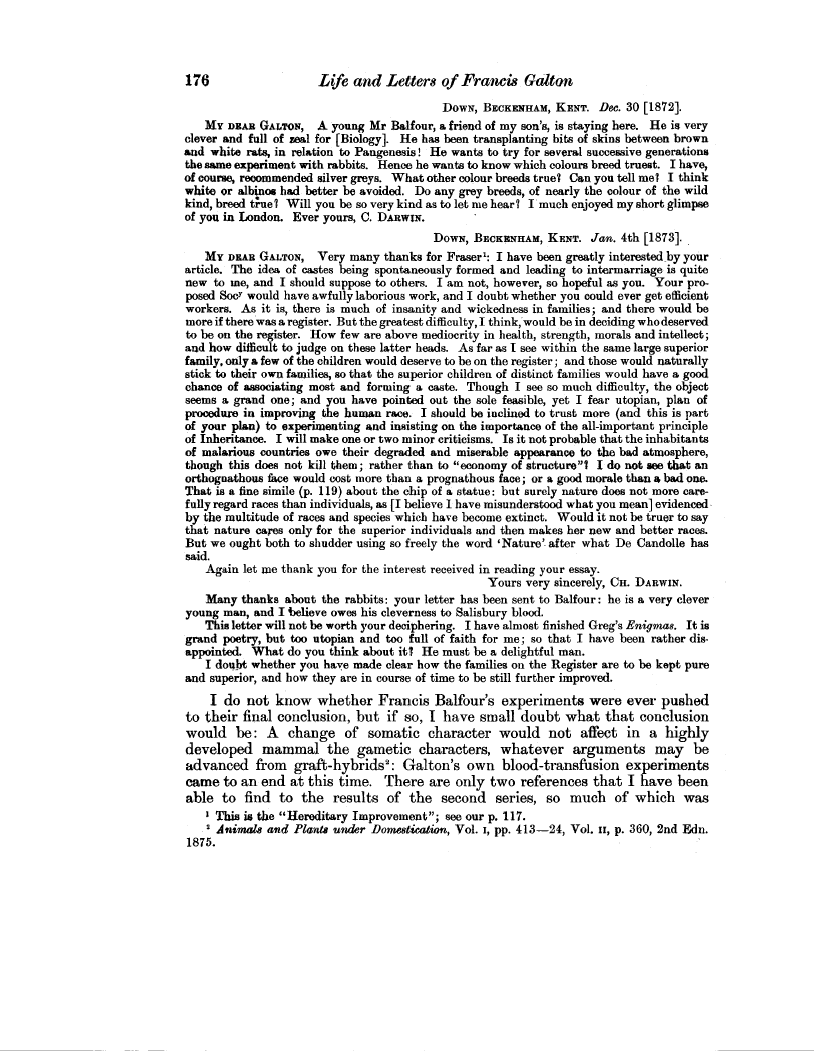1 i 6 Life and Letters of Francis Galton
DOWN, BECKENHAM, KENT. Dec. 30 [1872].
MY DEAR GAI.TON, A young Mr Balfour, a friend of my son's, is staying here. He is very clever and full of zeal for [Biology]. He has been transplanting bits of skins between brown and white rats, in relation to Pangenesis ! He wants to try for several successive generations the same experiment with rabbits. Hence he wants to know which colours breed truest. I have, of course, recommended silver greys. What other colour breeds true? Can you tell me? I think white or albinos had better be avoided. Do any grey breeds, of nearly the colour of the wild kind, breed true? Will you be so very kind as to let me hear? I 'much enjoyed my short glimpse of you in London. Ever yours, C. DARWIN.
DowN, BECKENHAM, KENT. Jan. 4th [1873].
MY DEAR GALTON, Very many thanks for Fraser': I have been greatly interested by your article. The idea of castes being spontaneously formed and leading to intermarriage is quite new to me, and I should suppose to others. I am not, however, so hopeful as you. Your proposed Soc9 would have awfully laborious work, and I doubt whether you could ever get efficient workers. As it is, there is much of insanity and wickedness in families; and there would be more if there was a register. But the greatest difficulty, I think, would be in deciding who deserved to be on the register. How few are above mediocrity in health, strength, morals and intellect; and how difficult to judge on these latter heads. As far as I see within the same large superior family, only a few of the children would deserve to be on the register; and those would naturally stick to their own families, so that the superior children of distinct families would have a good chance of associating most and forming a caste. Though I see so much difficulty, the object seems a grand one; and you have pointed out the sole feasible, yet I fear utopian, plan of procedure in improving the human race. I should be inclined to trust more (and this is part of your plan) to experimenting and insisting on the importance of the all-important principle of Inheritance. I will make one or two minor criticisms. Is it not probable that the inhabitants of malarious countries owe their degraded and miserable appearance to the bad atmosphere, though this does not kill them; rather than to "economy of structure"? I do not see' that an orthognatbous face would cost more than a prognathous face; or a good morale than a bad one. That is a fine simile (p. 119) about the chip of a statue: but surely nature does not more carefully regard races than individuals, as [I believe I have misunderstood what you mean] evidenced by the multitude of races and species which have become extinct. Would it not be truer to say that nature cares only for the superior individuals and then makes her new and better races. But we ought both to shudder using so freely the word `Nature'. after what De Candolle has said.
Again let me thank you for the interest received in reading your essay.
Yours very sincerely, CH. DARWIN.
Many thanks about the rabbits: your letter has been sent to Balfour: he is a very clever young man, and I believe owes his cleverness to Salisbury blood.
This letter will not be worth your deciphering. I have almost finished Greg's Enigmas. It is grand poetry, but too utopian and too full of faith for me; so that I have been rather disappointed. What do you think about it? He must be a delightful man.
I doubt hether you have made clear how the families on the Register are to be kept pure and superior, and how they are in course of time to be still further improved.
I do not know whether Francis Balfour's experiments were ever pushed to their final conclusion, but if so, I have small doubt what that conclusion would be : A change of somatic character would not affect in a highly developed mammal the gametic characters, whatever arguments may be advanced from graft-hybrids': Galton's own blood-transfusion experiments came to an end at this time. There are only two references that I have been able to find to the results of the second series, so much of which was
1 This is the "Hereditary Improvement"; see our p. 117.
2 Animals and Plants under Domestication, Vol. I, pp. 413-24, Vol. II, p. 360, 2nd Fdn. 1875.

